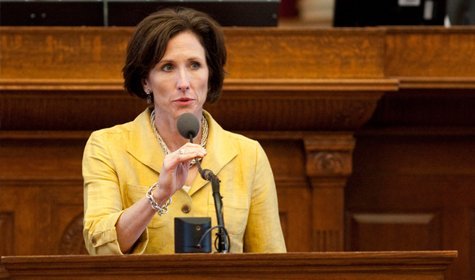AUSTIN – September 1 marked the start of a new fiscal biennium for the State of Texas. The new budget takes effect along with hundreds of new laws. Out of 6,276 bills filed in the House and Senate, just under 1,300 became law. State Senator Lois W. Kolkhorst had 25 out the of the 72 successfully passed bills she authored or sponsored become effective on September 1.
Especially significant among those bills is SB 791, “Maddie’s Law” a bill inspired by Farah Armstrong, a constituent from Katy. Mrs. Armstrong, met with Senator Kolkhorst over the course of her race and subsequently when she became senator to champion a bill that in instructs the Health and Human Services Commission to create a public education program to inform pregnant women and women who may become pregnant about the occurrence of Cytomegalovirus (CMV). CMV is a common virus that infects people of all ages, however, infections in newborns can lead to hearing loss, developmental disabilities and even death. Congenital CMV is the leading non-genetic cause of childhood hearing loss.
SB 791 instructs the Health and Human Services Commission to create a public education program to inform pregnant women and women who may become pregnant about the occurrence of CMV, the transmission of CMV, the birth defects that CMV can cause, methods of diagnosis, and available preventative measures.
“The very best ideas for bills come from the people,” said Kolkhorst. “As a mother, the story of Maddie touched my heart. She was only 12 days old when she died. I had never heard of CMV before meeting with Farah. Knowing that this virus is completely preventable, I wanted to help educate mothers and parents of this virus and what can be done to prevent harm to the unborn child.”
The Department of State Health Services, along with the Texas Medical Board, is in the process of developing the public education program required by the bill, which complements existing CDC recommendations and DSHS materials that pregnant women should be informed about CMV.
“I encourage all pregnant women or women considering pregnancy to learn more about the prevention of CMV,” said Kolkhorst.
Kolkhorst also passed legislation to protect foster children with SB 830 and HB 1180, effective September 1.SB 830 creates the office of consumer affairs for children in foster care under the purview of the Health and Human Services Commission. The new ombudsman’s office is responsible for protecting the rights of foster children and is independent of the Department of Family and Protective Services and the Health and Human Services Commission in order to ensure that it can most effectively serve the children and adults who depend on its protections.
“No child who has been neglected or who has suffered should have to be traumatized again when supposedly placed into a safe environment,” said Kolkhorst. “If a child is to be removed from their home, the highest standards of safety should be expected.”
HB 1180, authored by Rep. Cindy Burkett and sponsored by Senator Kolkhorst, requires DFPS to establish a searchable public database on the DFPS website that allows individuals to obtain information on residential child-care facilities, including family homes. The database will provide parents with valuable information on the people who care for their children.
Along with safeties for children, Kolkhorst passed a law to ensure the safety of personal data received and kept by the state.
Working with Gov. Greg Abbott on his bicentennial blueprint, Kolkhorst authored SB 1213. Nicknamed “de-identify/re-identify bill,” SB 1213 will prohibit individuals or companies from re-identifying people in anonymized data tables sold by the state. Some organizations use cross-referencing techniques to identify anonymized personal information. This information, which can include sensitive medical records, can then be collected in large databases to be sold to interested parties. SB 1213 protects the privacy of Texans by creating criminal penalties and a private cause of action against any entity that re-identifies anonymized information obtained from the state.
“I appreciate the Governor making this a priority,” said Kolkhorst. I’ve been working on privacy issues for nearly a decade. This was an unheralded bill in the session but one that will impact the lives of every Texan.”

